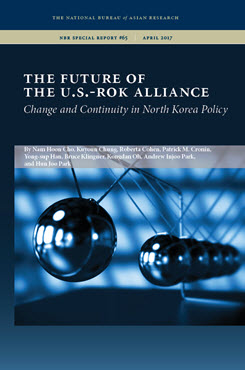The Trump Administration
Implications for the U.S.-ROK Alliance and Policy toward North Korea
This essay assesses the challenges for the U.S.-ROK alliance on the Korean Peninsula and recommends several options for the Trump administration to preserve and strengthen the alliance to deter North Korean aggression and proliferation.
EXECUTIVE SUMMARY
MAIN ARGUMENT
Changes in government in both the U.S. and South Korea, coupled with a dangerous regional security environment, ensure that U.S.-ROK relations will be severely tested in the coming months and years. But notwithstanding the different approach to U.S. foreign policy and style of leadership ushered in by President Donald Trump, enduring and shared national interests are likely to prevail in bilateral ties. North Korea’s mounting nuclear and missile capabilities will continue to reinforce the need for deterrence in the short run and for the Blue House and the White House to agree on a long-term comprehensive strategy for managing this threat. Both sides should remain open to serious dialogue with Pyongyang, but the lack of success in negotiating limits to North Korea’s weapons programs to date suggests that the most reliable bulwark for peace will remain a strong, ready, and well-coordinated alliance.
POLICY IMPLICATIONS
- Although South Korea is already shouldering considerable burdens to support the U.S. forward military presence on the Korean Peninsula, as the allies continue to adjust their roles, missions, and capabilities, each side will need to recalibrate its alliance commitments to ensure a sustainable and equitable division of labor.
- As South Korea prepares for a new government, possibly with a more liberal agenda than that of the past decade, it will be incumbent on both governments to continue to make full use of the alliance’s mature and successful institutional framework.
- As President Trump seeks to deliver on his campaign promises to create more jobs, recapitalize infrastructure, and revitalize manufacturing, he will want to build on the success of South Korea, both as a major global economy and as an important trading partner. The Korea-U.S. Free Trade Agreement can be tweaked along the lines of how President Trump appears set to collaborate with Canadian prime minister Justin Trudeau on tweaking the North American Free Trade Agreement.


